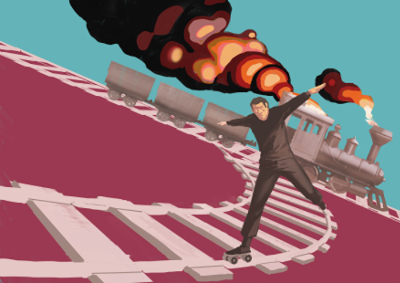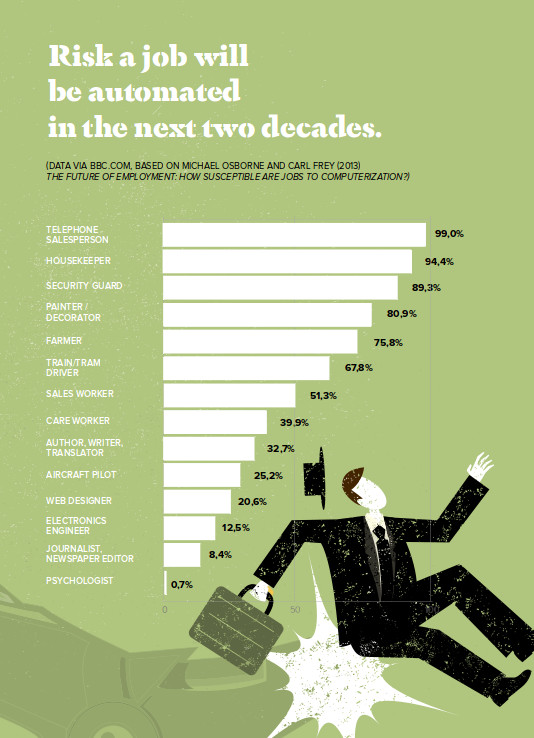The Road Ahead
The politics of time offers a response to the crisis of work, inviting us to talk about the conditions for freedom and the kind of society we want to live in.
Towards a Post-Work Society
- Issue #2
- Author
When a stranger meets you for the first time, the first question they will almost always ask is: “what do you do?” Convention tells us that what they really mean is: “what job do you perform?”, which is a terrible question to ask a person who does not work, or who dislikes the work that she does. It is also a sure sign that, whether we like it or not, we in industrial societies live in a profoundly work-centered world.
The centrality of work is grasped when we consider just how much time society spends working, in which we can also include the time spent looking and preparing for, traveling to and from, and recuperating from work. In his 1935 essay, “In Praise of Idleness”, Bertrand Russell lamented the amount of modern leisure time spent on “such amusements as are passive and vapid,” but the truth is that work, after devouring people’s time and energy, often leaves them inadequately resourced to do anything more fulfilling.
For those with demanding jobs, it becomes impossible to do anything outside of work that would require an investment of time and attention, or community ties. Unemployment does not offer any reprieve either, as even this has now been turned into a kind of work. In modern society, unemployment takes the form of “job-seeking”, which, like work, has its own performative demands and system of accountability.
We can also grasp the work-centered nature of society when we consider how many important social functions have been delegated to work. Work is society’s main mechanism for the distribution of income, meaning that most people rely on their work for survival. The ability to earn one’s own bread is what traditionally marks the passage to maturity, and working is also the main and certainly the most culturally approved way that people live out a public existence.
The Crisis of Work
If work is vital for income, social inclusion and a sense of identity, then one of the most troubling contradictions of our time is that this centrality of work persists even when work is in a state of crisis. The steady erosion of stable and satisfying employment makes it less and less clear whether modern jobs can offer the sense of moral agency, recognition and pride required to secure work as a source of meaning and identity. The standardization, precarity and dubious social utility that characterize many modern jobs are a major source of modern misery.
Mass unemployment is also now an enduring structural feature of capitalist societies. The elimination of huge quantities of human labor by the development of machine technologies is a process that has spanned centuries. However, perhaps due to high profile developments like Apple’s Siri computer assistant or Amazon’s delivery drones, the discussion around automation has once again been ignited. An often-cited study by Carl Frey and Michael Osborne anticipates an escalation of technological unemployment over the coming years. Occupations at high risk include the likes of models, cooks and construction workers, thanks to advances such as digital avatars, burger flipping machines and the ability to manufacture prefabricated buildings in factories with robots. It is also anticipated that advances in artificial intelligence and machine learning will allow an increasing quantity of cognitive work tasks to become automated.
What all of this means is that we are steadily becoming a society of workers without work: a society of people who are materially, culturally and psychologically bound to paid employment, but for whom there are not enough stable and meaningful jobs to go around. Perversely, the most pressing problem for many people is no longer exploitation, but the absence of opportunities to be sufficiently and dependably exploited. The impact of this problem in today’s epidemic of anxiety and exhaustion should not be underestimated.
 What makes the situation all the crueler is the pervasive sense that the precarious victims of the crisis are somehow personally responsible for their fate. In the UK, barely a week goes by without a smug reaffirmation of the work ethic in the media, or some story that constructs unemployment as a form of deviance. The UK television show Benefits Street comes to mind, but perhaps the most outrageous example in recent times was not from the world of trash TV, but from Dr. Adam Perkins’ thesis, The Welfare Trait. Published last year, Perkins’ book tackled what he defined as the “employment-resistant personality”. Joblessness is explained in terms of an inter-generationally transmitted psychological disorder. Perkins’ study is the most polished product of the ideology of work one can imagine. His study is so dazzled by its own claims to scientific objectivity, so impervious to its own grounding in the work ethic, that it beggars belief.
What makes the situation all the crueler is the pervasive sense that the precarious victims of the crisis are somehow personally responsible for their fate. In the UK, barely a week goes by without a smug reaffirmation of the work ethic in the media, or some story that constructs unemployment as a form of deviance. The UK television show Benefits Street comes to mind, but perhaps the most outrageous example in recent times was not from the world of trash TV, but from Dr. Adam Perkins’ thesis, The Welfare Trait. Published last year, Perkins’ book tackled what he defined as the “employment-resistant personality”. Joblessness is explained in terms of an inter-generationally transmitted psychological disorder. Perkins’ study is the most polished product of the ideology of work one can imagine. His study is so dazzled by its own claims to scientific objectivity, so impervious to its own grounding in the work ethic, that it beggars belief.
It seems we find ourselves at a rift. On the one hand, work has been positioned as a central source of income, solidarity and social recognition, whereas on the other, the promise of stable, meaningful and satisfying employment crumbles around us. The crucial question: how should societies adjust to this deepening crisis of work?
Business as Usual
Throughout the history of capitalism, societies have tended to compensate for the labor-displacing effects of productivity gains either by increasing the output of particular industries, or by expanding the economy into new industries and sectors. Anders Hayden has referred to this solution as a treadmill: the need for never-ending economic expansion simply to maintain employment levels.
Among the more dystopian possibilities of this trajectory is the vista of a world sunk in disposable consumer goods, produced primarily to keep people working and spending, as well the dismal prospect of a society where virtually all needs are outsourced to the market, and all social relations mediated through the economy. Perhaps the biggest objection to the solution of “more jobs”, however, is the unsustainable nature of perpetual economic expansion. Even if economic growth could keep pace with the demand for jobs, what would the environmental costs be? Pointing to well-established bodies of research on the depletion of natural resources, the loss of biodiversity, soil pollution, and that mother of all limits, climate change, political ecologists like Tim Jackson have shown that expanding the economy in order to provide work has become an increasingly unpalatable strategy.
 If the solution is not “more jobs”, what other responses are available to us? Under neoliberalism, citizens have been encouraged to take matters into their own hands. The most socially acceptable strategy today is to avoid the whirlpool of precarity, unemployment and meaningless work by personally investing in “employability”, making a long-term effort to gain the skills, qualifications and sensibilities that will be the most attractive to employers.
If the solution is not “more jobs”, what other responses are available to us? Under neoliberalism, citizens have been encouraged to take matters into their own hands. The most socially acceptable strategy today is to avoid the whirlpool of precarity, unemployment and meaningless work by personally investing in “employability”, making a long-term effort to gain the skills, qualifications and sensibilities that will be the most attractive to employers.
The project of employability might shape anything from what subjects people choose to study to which aspects of their personalities they deem as “problematic” and in need of reform. One of the biggest casualties of this focus on employability is education, whose role in the work-centered society has been reduced to an economic function. Education’s most readily accepted contribution is not to teach the principles of democracy, critical thinking or self-reliance, but to prepare and certify young people for the adoption of a pre-defined job role. Anxiety runs riot in the degree factory (among teachers as well as students), and the social mobility promised by educational advancement is in any case a poor substitute for genuine economic justice. Clearly not everybody can succeed in the race for decent jobs.
The need to become what Michel Foucault called an “entrepreneur of the self” in order to mitigate the insecurity of life under neoliberalism also demolishes the bargaining power of society’s precarious workers. One of the best assets of an employable subject is agreeableness—an aim to please—which puts workers in a weak position to negotiate better conditions for themselves. This is perhaps one explanation for the recently documented phenomenon of “presenteeism”, which sees people obediently staying late at the office, even if they have no work to do.
In a recent paper on graduate employability, Costea and colleagues suggested that the ultimate tragedy of employability is its psychological condition of “endless potentiality”. The entrepreneurial self is never satisfied that it has done enough. Every relationship is a potential “connection” and every activity a potential item for the resumé. Coupled with the spillage of work into the home via networked technologies, the “endless potentiality” of employability renders understandable one of society’s guiltiest collective secrets: the hidden craving for a brief spate of personal illness to—at least for a few days—make it all stop.
A Radical Alternative
It seems we need a more radical alternative—and, fortunately, there is no shortage of resources to turn to for inspiration. There exists an important legacy of critical thinkers who have argued that the most rational and liberating solution to the crisis of work is neither economic nor personal. This provocative group of thinkers—ranging from critics like André Gorz and Herbert Marcuse to members of the Italian post-workerist movement and contemporary feminist authors like Kathi Weeks—have all argued that the only legitimate solution to the crisis of work is a political one. Recognizing that the work-centered society is no longer tenable, these authors argue that we must radically rethink the role of work in modern society.
A common theme in these critiques is to note how capitalism’s tremendous capacity for productive development has opened up the theoretical possibility of more free time. The machines do more of the necessary work, leaving us free for other things. Crucially, however, technology alone does not have the capacity liberate us from work. As Gorz argued in his Critique of Economic Reason, “the development of productive forces may, of itself, reduce the amount of labor that is necessary [but] it cannot, of itself, create the conditions which will make this liberation of time a liberation for all.”
For critics like Gorz, the challenge set before us is to develop a political struggle that will allow us to finally turn the time saved by decades of productivity gains to humane ends. This collective challenge—which Gorz called the “politics of time”—requires the definition of new freedoms and collective guarantees, which will allow everybody to benefit from more free time. One of the things that makes the critique of work such an exciting project is that the concerns of critics are always differently accented. However, in terms of political proposals, there are a number of these that are fairly consistent across the board.
The first proposal is for a society-wide policy of shorter working hours, coupled with a social redistribution of the necessary work. By spreading the available working hours more evenly among populations, the goal here is to reverse the escalating division of society into stressed-out occupational elites on the one hand, and a mass of unemployed, underemployed or precariously employed people on the other. Each of us would work less so that more of us could work.
This goes hand in hand with a second proposal to uncouple the right to a wage from the activity of work, and explore alternative methods of income distribution. The growing discussion around the Universal Basic Income is a promising sign. Basic Income has many competing justifications, but an important one is that it promises to remedy the depressing wastage of time and talent witnessed in the capitalist present, where social inclusion still depends on the ability to keep a job. Whether their labor power is required by the formal economy or otherwise, people who benefit from a Basic Income will be resourced to undertake work for themselves and for each other, if they so choose. The hope is that, with the benefit of time and an income, people would be able to develop a range of interests and capacities outside employment.
These changes would perhaps not amount to much were they not underpinned by a more qualitative shift in our cultures and sensibilities. A radical solution to the crisis of work also requires that we re-examine ourselves and explore the possibility of alternative ways to experience the pleasure and solidarity that people have conventionally sought (often unsuccessfully) in work. To articulate this in terms of a demand: we need to call for an end to the conservative idea that paid work is inherently healthy and civilizing.
Some will no doubt object by saying that employment is crucial for people’s sense of wellbeing (and there is a wealth of research on the miseries of unemployment that they may cite as evidence). The dynamics of this debate are complicated because work really is in some senses important for health in a society organized to promote a dependency on work. It is only a moral attachment to work, however, that stops us from remaining open to the idea that the future could be different. In the future, it is perfectly feasible that alternative activities would allow us to experience the sense of solidarity and purpose that work now provides (or fails to provide, as the case may be). We would also do well to remind doubters that the current construction of identity and social solidarity through work renders us supremely fit for exploitation.
Others might protest the critique of work as a somewhat juvenile defense of “the right to be lazy”. For example, when the UK Prime Minister David Cameron declared that his government would mainly serve the interests of “hardworking people”, the ethical lines were firmly drawn: are you a worker or a shirker? It was thought that there is no space to occupy in between, no legitimate way of making a social contribution other than through work.
It is important that we reject this dichotomy whenever possible, and also recognize that the critique of work is much more than the defense of a right to be lazy. Whilst laziness certainly has a rightful place in a post-work future, what is ultimately demanded by the critique of work is less an entitlement to idleness than a right to develop human capacities more fully. In The Problem with Work, Kathi Weeks articulates it well when she argues that to critique work is not necessarily to deny work’s value:
It is, rather, to insist that there are other ways to organize and distribute that activity and to remind us that it is also possible to be creative outside the boundaries of work. It is to suggest that there might be a variety of ways to experience the pleasure that we may now find in work, as well as other pleasures that we may wish to discover, cultivate and enjoy.
At a time when work is very clearly in a state of crisis, the critical project that Weeks describes here is an important one. Given the escalating crises of work, the dreamer is perhaps no longer the utopian who searches for alternatives, but the person who believes things can go on as they are. The radical solution is the sane solution.
At the same time, however, it would be a mistake to see the critique of work merely as a “solution” to crisis. It is also a chance to finally deliver on the original promise of capitalism’s productive development: to liberate us from work and allow us to collectively enjoy more free time. The hope is that a politics of time would allow us to explore those aptitudes and aspects of ourselves that often get sidelined in a work-centered world. The hope is that having more time outside work would, with the benefit of new public facilities, spark the creation of informal networks of production and exchange outside the boundaries of the formal economy.
Perhaps an increase in free time would also allow people to become more active citizens. One of the reasons democratic debate is currently in such a moribund state is that our busy lives leave us with so little time to engage with politics, collectively organize or find out what is going on in our communities. What a politics of time perhaps promises above all, however, is to allow us to use our free time for something other than escaping from work.
The Road Ahead
The social construction of work as a key source of income, rights and belonging is unswerving. Yet what is also clear is that for vast numbers of people work has become an unreliable source of these things. This is a profound crisis, requiring an equally as profound re-evaluation of work and its place in modern society. This task—which André Gorz has called the politics of time—aims to offer a practical response to today’s disintegrating world of work. But more than this, it also invites us to talk about the conditions for freedom and to engage in a fresh dialogue about the kind of society we would like to live in.
Overall, I am inclined to agree with Gorz’s suggestion that the cultural shift to a post-work society has already occurred to a certain extent. If we slice through the glorification of the work ethic in the conservative media, what we will find is that massive numbers of people have already mentally clocked-out of the work-centered society, and are now actively trying to maximize their leisure time, reconfiguring their identities through non-work activities. Anti-work sensibilities can be found everywhere, whether it is artists and hobbyists finding time to do what they really love, unpaid volunteers and carers devoting their time to others, people retiring early in order to rediscover lost pleasures, or graduates slowly giving up on the dream of a stable job that they enjoy.
I have documented these anti-work sensibilities to some degree in my book, The Refusal of Work, which drew on interviews with people trying (with varying degrees of success) to resist performing paid work. Many were willing to endure significant hardship in order to do so. One of the notable things about this study was that its participants were less radical political subjects, demanding social alternatives, than ordinary people who were simply trying to work less and have more leisure time. They embodied a latent dissatisfaction with work that has yet to find political purchase, and the dilemma we perhaps now face is how to legitimate and mobilize this dissatisfaction. We need to find ways to articulate it in the form of a political alternative.
With regards to the prospects of developing a post-work politics along these lines, it is fair to say that I concluded my research on a somewhat pessimistic note. In the UK, mainstream politics on both the left and the right still seems obsessed with the dignity of work. However, there have been some notable rumblings since my research was published. The anti-work politics of the UK activist group Plan C are worth mentioning here, along with the New Economics Foundation—a think tank that has been exploring the possibility of a 21-hour working week. The discussion around Basic Income also appears to be mounting, with a number of notable campaigns and experiments having been documented by the Basic Income Earth Network in recent months.
Also worth mentioning is the recent “No Jobs Bloc”—a coalition of groups coordinated by the Radical Assembly, who marched as part of London’s anti-austerity protest earlier this year. The marchers carried banners with slogans inspired by Nick Srnicek and Alex Williams’ recent critique of work, Inventing the Future, demanding a Basic Income for all, full automation, a reduction of the working week, and the attribution of value to unpaid and emotional labor. This popular uptake of the critique of work is heartening, and it is hard to predict the fate of the critique in the future. One thing, however, is certain: if anyone had told me a year ago that activists in the UK would be chanting anti-work slogans in the streets, I would not have believed it.
Source URL — https://roarmag.org/magazine/towards-a-post-work-society/
Next Magazine article
Basic Income and the Future of Work
- Daniel Raventós, Julie Wark
- June 25, 2016
Socialize the Internet!
- Joseph Todd
- June 25, 2016



